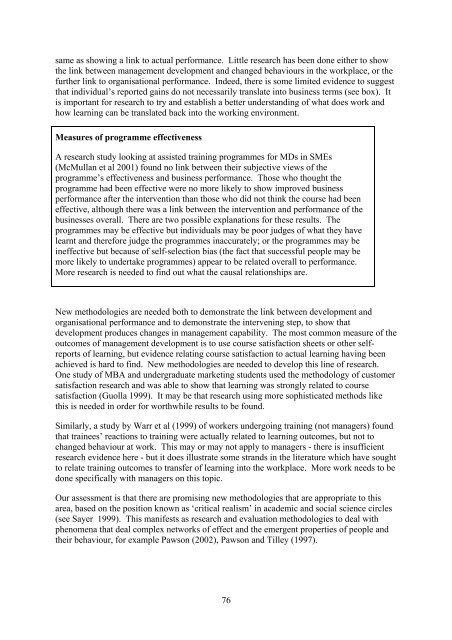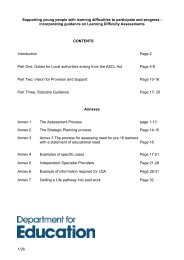The Development of Management and Leadership Capability and its ...
The Development of Management and Leadership Capability and its ...
The Development of Management and Leadership Capability and its ...
Create successful ePaper yourself
Turn your PDF publications into a flip-book with our unique Google optimized e-Paper software.
same as showing a link to actual performance. Little research has been done either to show<br />
the link between management development <strong>and</strong> changed behaviours in the workplace, or the<br />
further link to organisational performance. Indeed, there is some limited evidence to suggest<br />
that individual’s reported gains do not necessarily translate into business terms (see box). It<br />
is important for research to try <strong>and</strong> establish a better underst<strong>and</strong>ing <strong>of</strong> what does work <strong>and</strong><br />
how learning can be translated back into the working environment.<br />
Measures <strong>of</strong> programme effectiveness<br />
A research study looking at assisted training programmes for MDs in SMEs<br />
(McMullan et al 2001) found no link between their subjective views <strong>of</strong> the<br />
programme’s effectiveness <strong>and</strong> business performance. Those who thought the<br />
programme had been effective were no more likely to show improved business<br />
performance after the intervention than those who did not think the course had been<br />
effective, although there was a link between the intervention <strong>and</strong> performance <strong>of</strong> the<br />
businesses overall. <strong>The</strong>re are two possible explanations for these results. <strong>The</strong><br />
programmes may be effective but individuals may be poor judges <strong>of</strong> what they have<br />
learnt <strong>and</strong> therefore judge the programmes inaccurately; or the programmes may be<br />
ineffective but because <strong>of</strong> self-selection bias (the fact that successful people may be<br />
more likely to undertake programmes) appear to be related overall to performance.<br />
More research is needed to find out what the causal relationships are.<br />
New methodologies are needed both to demonstrate the link between development <strong>and</strong><br />
organisational performance <strong>and</strong> to demonstrate the intervening step, to show that<br />
development produces changes in management capability. <strong>The</strong> most common measure <strong>of</strong> the<br />
outcomes <strong>of</strong> management development is to use course satisfaction sheets or other selfreports<br />
<strong>of</strong> learning, but evidence relating course satisfaction to actual learning having been<br />
achieved is hard to find. New methodologies are needed to develop this line <strong>of</strong> research.<br />
One study <strong>of</strong> MBA <strong>and</strong> undergraduate marketing students used the methodology <strong>of</strong> customer<br />
satisfaction research <strong>and</strong> was able to show that learning was strongly related to course<br />
satisfaction (Guolla 1999). It may be that research using more sophisticated methods like<br />
this is needed in order for worthwhile results to be found.<br />
Similarly, a study by Warr et al (1999) <strong>of</strong> workers undergoing training (not managers) found<br />
that trainees’ reactions to training were actually related to learning outcomes, but not to<br />
changed behaviour at work. This may or may not apply to managers - there is insufficient<br />
research evidence here - but it does illustrate some str<strong>and</strong>s in the literature which have sought<br />
to relate training outcomes to transfer <strong>of</strong> learning into the workplace. More work needs to be<br />
done specifically with managers on this topic.<br />
Our assessment is that there are promising new methodologies that are appropriate to this<br />
area, based on the position known as ‘critical realism’ in academic <strong>and</strong> social science circles<br />
(see Sayer 1999). This manifests as research <strong>and</strong> evaluation methodologies to deal with<br />
phenomena that deal complex networks <strong>of</strong> effect <strong>and</strong> the emergent properties <strong>of</strong> people <strong>and</strong><br />
their behaviour, for example Pawson (2002), Pawson <strong>and</strong> Tilley (1997).<br />
76
















